The landscape in Wesbrook Place is continuing its transformation with the demolition of an underused building to eventually make way for new development.
Late last month, crews began demolishing what is known as the Pulp and Paper Institute of Canada building at 3800 Wesbrook Mall. The process is overseen by UBC Properties Trust (UBCPT).
Over the past several years, the building has appeared chronically underused, with little pedestrian traffic and a small fleet of unused and rusting pickup trucks in the parking lot.
Email questions from The Campus Resident regarding the demolition process and how residents living in the surrounding area may be affected were not directly answered by UBCPT.
When asked about the possibility of debris, pollution, or noise issues, an official with UBCPT wrote, “The work is being completed within UBC’s allowable noise bylaws. We don’t anticipate any concerns for residents. Completion is anticipated by late summer/early fall 2024.”
UBCPT did not provide any details on whether any debris or pollution mitigation efforts would be required during the demolition.

In a written statement to The Campus Resident, Matthew Ramsey, acting senior director of media relations at UBC, said the demolition would be carried out “according to all relevant environmental regulations.”
The building was built in 1986, one year after UBC mandated that construction materials containing asbestos could not be used in any new building.
Since then, building ownership and the leased land it sits on has changed hands at least twice.
The 7,550 square metre building, built on 2.3 hectares, was sold in 2013 by FP Innovations to an entity called Canada Zhonghe Investment Ltd. after being listed for $10.5 million.
Little is known how the building was used by Zhonghe, which has been described as a “Chinese coal firm.” Roughly five years later, the building began to be used by a group called the Emerging Technologies Centre of Canada and China.

In 2022, UBC bought the remaining lease of the building and lot from Zhonghe for $13.8 million, paving the way for Wesbrook’s southward expansion.
In addition to demolishing the building, 206 trees will be removed from the site according to UBC’s Campus and Community Planning, including 99 eastern white cedars and 38 Japanese cherry trees.
There are no solid plans for the site, however a sign of what the area could look like can be found in UBC’s Campus Vision 2050.
Artistic renderings show three towers on the site along the edge of Pacific Spirit Regional Park in an area called “Wesbrook Place South”—part of the southward expansion of Wesbrook Place.
New development in the area could add some 121,000 square metres of new housing, amounting to 1,300 addition units, and spread across towers ranging from 22 to 39 storeys. Mid-rise buildings, as currently found throughout Wesbrook, are also expected to be part of the housing mix according to CampusVision 2050.
Ramsay said the renderings are meant to be “illustrative of the development potential” of the site, and any further planning will only begin after UBC’s Land Use Plan as been adopted by the provincial government.
“While the renderings are illustrative, the description of the amount of new housing and the form of development reflects the intentions for the southward expansion of Wesbrook neighbourhood,” he said.
“Planning for this expansion will begin after the land use plan has been adopted by the Ministry of Municipal Affairs.”
Ramsay said an amendment to the existing Wesbrook Neighbourhood Plan and a public consultation process are expected later this year and will include a review of existing plans and potential new uses for the site.
“Once the neighbourhood plan has been amended and approved, any new development proposal for this site will require a new development permit application and consultation with the community,” Ramsay added.
EMMANUEL SAMOGLOU IS THE MANAGING EDITOR OF THE CAMPUS RESIDENT.
